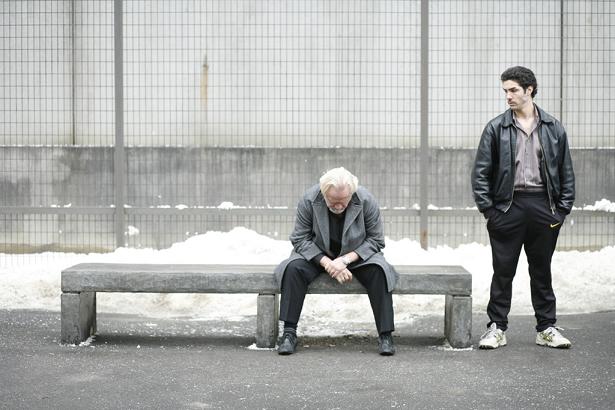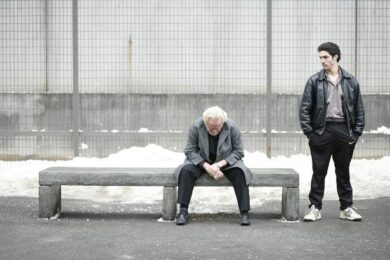Will Self, accorded the job of writing an introduction to an updated translation of We by Yevgeny Zamyatin, candidly declared he’d never actually read the book when assigned the task in hand. "I’m very glad I did," he wrote, "I may be a little too old for literary revelations, for those seminal reading experiences that, like first loves, are incised on the brain and heart; yet were it possible – perhaps employing a kind of psychosurgery . . . to retrospectively implant in my growing mind the memory of this book, it’s an operation I would willingly undergo."
With music too, one could only admire and envy the relish John Peel managed to perpetually maintain for new obscure sounds, without ever appearing to acquiesce to the catlike antipathy that creeps up on the rest of us, an inevitable by-product of the ageing process. Films too, like Father Christmas and masturbation, tend not to thrill in quite the same way as they did when you first discovered them.
Which is why Jacques Audiard’s A Prophet, is such a great film. It feels like an important film, in the same way that Reservoir Dogs felt important, or Cidade de Deus or A Clockwork Orange. It’s no coincidence that all the films I’ve just mentioned were extremely violent, each inspiring a fervent and fetid débat du jour, and each one a crime thriller of sorts, a genre that has become devalued in recent times thanks to a glut of terrible films usually staring Jason Statham. Although certainly not without its flaws, A Prophet, at over two-and-a-half hours long, is exquisitely paced and causes a rare and welcome surge of adrenalin in the viewer, or it certainly did me. Compared with Sherlock Holmes, a two-hour slog directed by that artless purveyor of moronic cartoon brutality, Guy Ritchie, Audiard’s picture flashes by with barely a glance at a watch. The film has garnered universal praise, but with it has come the inevitable backlash, led by bastions of the new puritanism that pervades the media in these post-Sachsgate times.
A Prophet is the story of an uneducated 19-year-old Arab, Malik who, initially shocked by his surroundings and one horrific task he’s forced to undertake, quickly becomes something of an incarcerated autodidact. He uses his incredible untapped gift for languages with a mixture of street smart and duplicity to rise up through the criminal underworld within the prison and somehow appease the segregated groups within, from the Corsican mafia he works for to his own Muslim brethren. The prophet of the title never really takes on too much significance, but it’s a cool name nonetheless, or at least it is in its intended vernacular, Un Prophète. English may be the international Lingua Franca these days, but is a cinema goer who can only parles l’Anglais really going to be put off watching a two-hour plus movie with subtitles because the title is in French?
If a few reviewers balked at the title, more are joining the inevitable righteous crusade. Audiard’s lassez-faire attitude to violence with a distinct lack of moralising has worked some critics up into a proper indignant lather – critics who, it has to be assumed, would also denounce the majority of Martin Scorsese’s work presuming the same rules apply.
"I’m only sorry I can’t join in the chorus of wholehearted approval," laments Chris Tookey in the Daily Mail. "A Prophet glorifies crime and regards murder as a perfectly normal response to being a member of a racially abused underclass – which may be a fashionable doctrine among film critics, but may not strike quite such a responsive chord with the general public."
The fact the character Malik, played with enigmatic cool by Tahar Rahim, is an Arab, and a Muslim Arab at that, was never going to escape the Daily Mail, but such indignation doesn’t stop at tabloids for Middle-Englanders. The Sunday Times critic complains of gangster fatigue: "I’m so tired of watching men shooting men, men hitting men, men bleeding, men dying…", he moans, with perhaps some justification, before later questioning the director’s lack of conscience. "By the end, he has outsmarted and outgunned others to become yet another bigwig murderous drug dealer. It’s a triumph for Malik, but what kind of achievement is it really?"
If the brutal crime thriller has been sullied by the ubiquity of nasty, badly-made imitations, and tarnished because of our new found virtuousness that we’re all upholding these days, nothing contaminated the genre more than its hijacking by the Loaded generation, who revelled in the machismo while ignoring the art. And while A Prophet is all too aware of its own cult cool, it transcends it by being such a riveting, scintillating piece of film-making. Last year’s Der Baader Meinhof Komplex was a worthy stab but got muddied after an initially thrilling opening hour and took too many historical liberties to justify its inclusion in the pantheon of greats. A Prophet is an important movie because it is a rare instant classic that will no doubt inspire a raft of dross coming to a theatre near you very soon.



